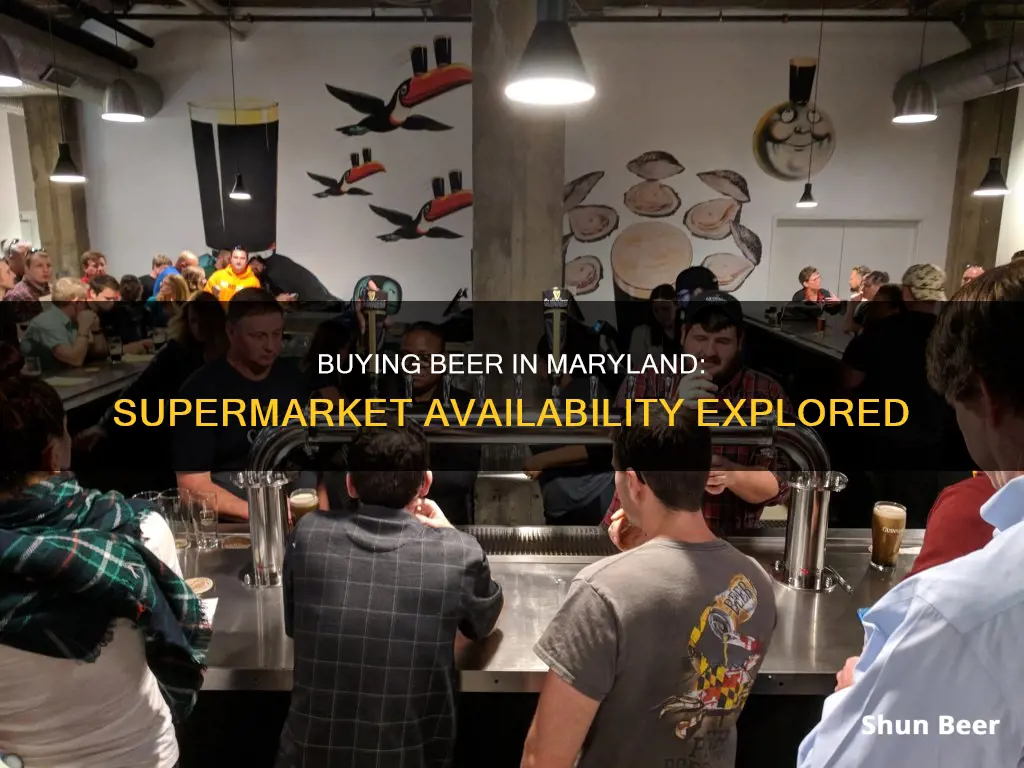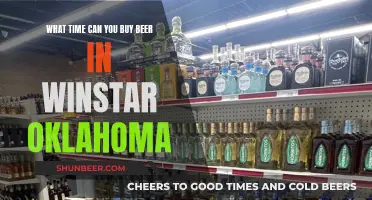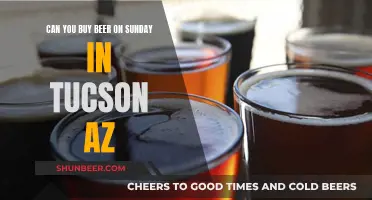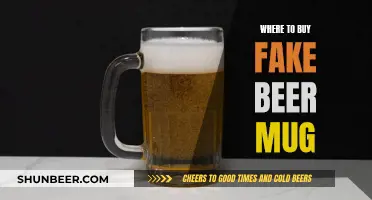
Maryland has some unique laws regarding when and where you can buy alcohol. The state is one of the few that ban beer and wine sales in grocery stores, with a 1978 prohibition preventing most chain stores from selling alcohol. However, there are exceptions to this rule, with some counties and stores permitted to sell alcohol, subject to individual county laws. A movement to change the law has gained traction, with advocates citing inconvenience and lost revenue for the state as reasons for reform.
| Characteristics | Values |
|---|---|
| Beer and wine sales in supermarkets | Restricted due to a 1978 statewide prohibition |
| Exceptions | A handful of grandfathered-in chains |
| Beer and wine sales in pharmacies or wholesale clubs | Yes and no. A limited number of chain stores are grandfathered in to sell beer and wine |
| Beer and wine sales at gas stations and convenience stores | Restricted |
| Beer and wine sales on Sunday | Restricted to freestanding alcohol stores and varies by county |
| Buying beer and wine online | Restricted and subject to county regulations |
| Beer and wine to-go | Allowed under a gubernatorial executive order signed in 2020 |
What You'll Learn
- Beer and wine can be bought in some rural Maryland counties
- There's a push to allow beer and wine sales in all Maryland grocery stores
- Maryland's liquor laws are archaic and need to be reformed
- Beer and wine sales in grocery stores would increase overall sales in Maryland
- Grocery stores in Maryland want to sell beer and wine

Beer and wine can be bought in some rural Maryland counties
Maryland is one of the few states that ban the sale of beer and wine in chain grocery, wholesale, pharmacy, and convenience stores. This is due to a 1978 prohibition that aimed to protect small "mom and pop" liquor stores from competition from larger retailers. However, there are a handful of chain stores that are exempt from this law due to a "grandfather clause".
In recent years, there has been a growing movement to change the law and allow beer and wine sales in all Maryland grocery stores. A poll found that almost 80% of Marylanders support this change, and over 50,000 people have contacted lawmakers to make the change. The Maryland Retailers Association has launched a website, mdalcoholchoice.com, to advocate for this change and provide information to shoppers.
While the sale of beer and wine in Maryland grocery stores is still illegal in most of the state, there are some rural counties where it is permitted. These include Talbot, Wicomico, Worcester, and St. Mary's counties. Additionally, Prince George's County allows each corporation to have one location that sells beer and wine.
The laws surrounding alcohol sales in Maryland vary by county, and it can be challenging for residents to navigate the restrictions. For example, in some counties, alcohol can be purchased on Sundays, but only at freestanding alcohol stores, and the hours permitted vary.
The push to change the law and allow beer and wine sales in all Maryland grocery stores is ongoing, and it remains to be seen whether the state will update its outdated laws to reflect the desires of its residents.
Buying Beer Early in Tennessee: What's the Legal Morning Limit?
You may want to see also

There's a push to allow beer and wine sales in all Maryland grocery stores
Maryland is one of the few states in the US that prohibits the purchase of beer and wine in grocery stores. This is due to a 1978 law that restricts the sale of alcohol to stand-alone, non-chain stores, with licensing restricted to Maryland residents. However, there is a growing push to change this law and allow beer and wine sales in all Maryland grocery stores.
The movement to bring beer and wine to Maryland supermarket shelves has gained significant traction, with advocates launching statewide campaigns and gathering support from Maryland residents. Polls show that almost 80% of Marylanders support being able to buy beer and wine at their local grocery stores, and over 50,000 people have reached out to lawmakers in favor of changing the law. The Maryland Retailers Association, which has long advocated for supermarkets to sell beer and wine, has also joined the campaign.
The current law is seen as inconvenient and outdated, with many shoppers expressing frustration at having to go to a separate store to buy beer or wine. Additionally, it is argued that the law hurts local craft breweries and wineries by limiting their exposure to a wider audience. The state is also missing out on potential revenue, with an analysis estimating that allowing beer and wine sales in grocery stores could bring in an additional $24.1 million in tax revenue.
In 2021, Delegate Lily Qi and Senator Cory McCray proposed a bill that would put a referendum to lift the ban on beer and wine sales in grocery stores to a vote. While the bill did not pass, Qi and McCray continue to advocate for change, and a similar bill may be proposed again in the future.
While there is strong support for allowing beer and wine sales in Maryland grocery stores, there are also concerns about the potential impact on small liquor stores and communities with limited healthy food options. However, research suggests that existing stores would only be marginally impacted, and incentives could be implemented to encourage grocers to operate in underserved areas.
Retailers' Freedom to Buy Beer Outside of Exclusive Contracts
You may want to see also

Maryland's liquor laws are archaic and need to be reformed
Maryland's liquor laws are indeed archaic and in dire need of reform. The state is one of only a handful that restricts beer and wine sales to liquor stores. This is due to a 1978 statewide prohibition that prevents most chain grocery, wholesale, pharmacy, and convenience stores from selling alcohol.
This law is outdated and inconvenient for consumers, who often have to make a separate trip to a dedicated liquor store to buy alcohol. It also limits the success of local craft breweries and wineries, which are unable to showcase their products to a wider audience. In addition, grocery stores miss out on a stabilizing product, and the state misses out on tax revenue. An analysis by MD Alcohol Choice found that allowing beer and wine sales in grocery stores would increase overall sales in Maryland by $192.8 million, create 760 new jobs, and bring in $24.1 million in additional tax revenue.
The law was originally intended to protect small "mom and pop" liquor stores from competition from larger chains. However, this protectionist measure is no longer necessary, as small businesses are now only marginally impacted by the presence of alcohol sales in grocery stores. In fact, allowing alcohol sales in grocery stores could actually benefit small liquor stores by increasing overall demand for alcohol. Furthermore, the law is confusing for consumers, who are unsure why some chain stores are allowed to sell alcohol while others are not.
Public opinion is strongly in favor of reforming Maryland's liquor laws. Polls show that almost 80% of Marylanders support being able to buy beer and wine at their local grocery store, and over 50,000 people have reached out to the legislature in favor of changing the law.
Maryland needs to update its liquor laws to reflect the needs and preferences of modern consumers. Reforming these archaic laws would bring numerous benefits to the state, including increased convenience, economic growth, and tax revenue.
Buying Beer in Horry County: Sunday Shopping Laws Explained
You may want to see also

Beer and wine sales in grocery stores would increase overall sales in Maryland
Maryland is one of the few states in the US that prohibits the sale of beer and wine in grocery stores. This restriction dates back to a 1978 law that was intended to protect small, independent liquor stores from competition from large supermarket chains. However, there is now a growing movement to change this law, with advocates arguing that it would increase overall sales in Maryland.
A recent poll found that almost 80% of Marylanders support the sale of beer and wine in supermarkets, and over 50,000 people have called on lawmakers to make the change. The Maryland Retailers Association, which is leading the campaign, argues that the current law is inconvenient for shoppers and results in lost revenue for the state.
In addition to increasing overall sales, allowing beer and wine sales in grocery stores could also provide economic benefits for the stores themselves. Fresh-food grocery stores operate on very low-profit margins, and alcohol sales could make a critical difference in their success. It could also be a deciding factor in determining locations for new stores and reducing food deserts.
Furthermore, the change would not negatively impact small, independent liquor stores. In fact, it could even benefit these businesses by increasing competition and driving down prices. Additionally, independent stores often offer a level of customer service and expertise that grocery stores cannot match.
While there are concerns that expanding alcohol sales could increase underage drinking and alcohol-related harm, there is little data to support these claims. Maryland already allows beer and wine sales in grocery stores in some rural counties, and there is no evidence that this has led to negative outcomes.
In conclusion, allowing beer and wine sales in grocery stores in Maryland would increase overall sales and provide numerous economic benefits for retailers and the state. It would also provide added convenience for shoppers, who would no longer need to make a separate trip to a dedicated liquor store.
Beer Buying at RDU: What's Allowed?
You may want to see also

Grocery stores in Maryland want to sell beer and wine
Grocery stores in Maryland are campaigning for the right to sell beer and wine. The current law, established in 1978, prohibits the sale of alcohol in chain stores, including big-box wholesalers and grocery store chains. The law was designed to protect small "mom and pop" liquor stores from competition from larger retailers.
However, the law is confusing for consumers and, according to some, hurts the state economically. A grassroots group called MD Alcohol Choice commissioned a study that found Maryland's restrictions on beer and wine sales in grocery stores cost the state jobs and tax revenues. The study determined that allowing beer and wine sales in grocery stores would increase overall sales in Maryland by $192.8 million, create 760 new jobs, and bring in $24.1 million in additional tax revenues.
Public opinion is largely in favor of changing the law. Polls show that almost 80% of Marylanders support being allowed to buy beer and wine at their local grocery store, and over 50,000 people have reached out to the legislature in favor of changing the law.
Some counties in Maryland, including Talbot, Wicomico, Worcester, and St. Mary's, already allow grocery stores to sell beer and wine.
Tampa's 24-Hour Beer Buying: Is It Possible?
You may want to see also
Frequently asked questions
No, Maryland is one of the few states that ban the sale of beer and wine in grocery stores.
Due to a 1978 statewide prohibition, which was intended to protect small "mom and pop" liquor stores from competition from larger retailers.
Yes and no. A limited number of chain stores were granted permission in 1978 to sell beer and wine, subject to county laws.
No, but there is a movement to change this. Senate Bill 763 sought to change Maryland's laws to allow the sale of beer and wine in convenience stores.
Yes, but only through a limited number of partnerships with stand-alone liquor stores, and it is subject to county laws.







